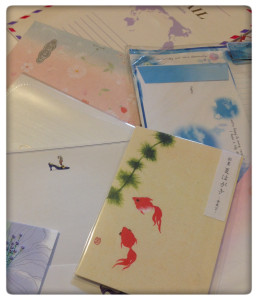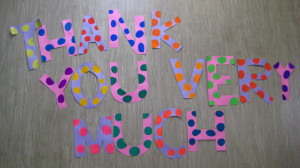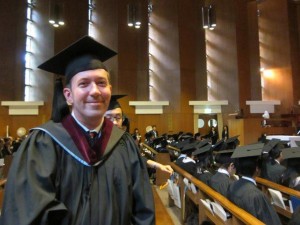Rural Reflections: JET alum Marshall Hughes shares an unseen side of Japan in his memoir of teaching in the inaka
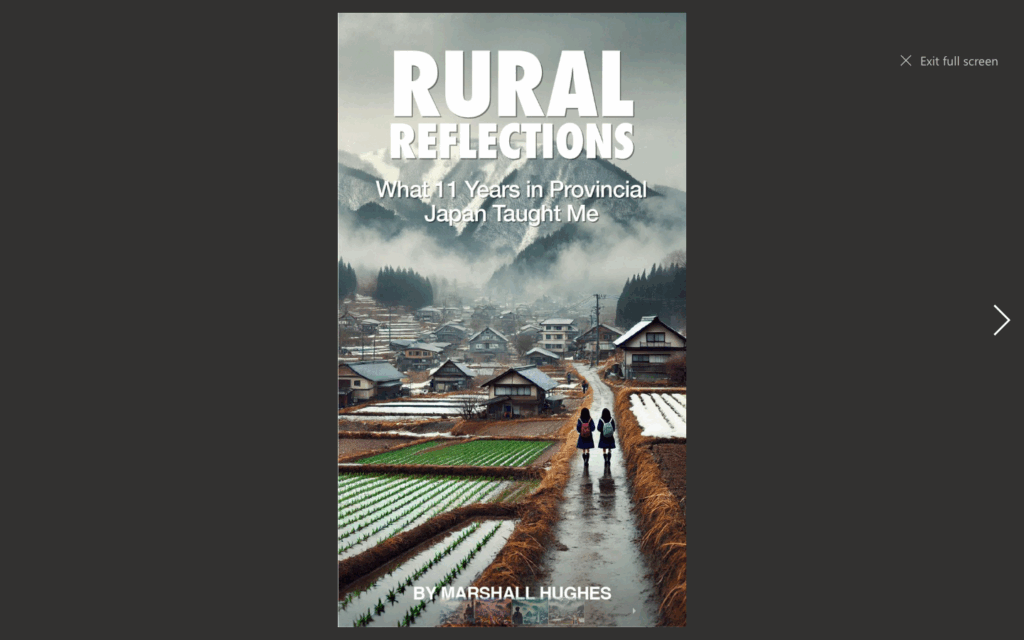
Posted by: Margie Banin (Kochi-ken, 2005–2007), a former CIR with a love of the written word. Currently she connects others to Japan through translating, writing, and editing texts on Japan. Margie also manages the JETwit Bluesky account, serves as the JETwit Volunteer Coordinator and a JETwit jobs-list welcomer, and engages in various other JETwit outreach activities.
A number of books over the years have been written about the JET (and non-JET) teaching experience in Japan. JET alum Marshall Hughes (Tochigi-ken, 1990–1991; Ibaraki-ken, 1992–1995) has recently added to this genre with Rural Reflections: What 11 Years in Provincial Japan Taught Me. After his four-year JET experience, Hughes taught from 1996 to 2001 in Mitsukaido-shi, Ibaraki-ken, and for 25 years in Japan overall before retiring to Chiba in 2024.
Hughes’ book differs from others in that his book spans eleven years in four cities. He writes familiar stories of the typical ups and downs that all JETs had, but also gets personal with stories of student tragedies and other less-than-glamorous aspects of the JET, and Japan, life. Overall, the book takes a real look at sometimes hard-to-believe experiences with humor and interesting cultural/historical points tossed in.
Hughes says that when he became a JET in the early 1990s, foreigners in his area were “something to gawk at, follow around town on bicycles, and at times to consider less than human.” Still, his love for Japan never faded. In 2013, he returned for a visit to his first city, Yaita-shi in Tochigi-ken, and as he was walking back to his car from the main school where he had taught, he started crying. “A flood of memories came back to me of just how pure-hearted the people were there. Before I went to Yaita, I didn’t know any place on earth where people had such pure hearts.”
For former JETS, especially those from the early years of the program or who lived in rural areas, the book is a nostalgic trip down memory lane.
Of Hughes’ book, author Evan Powell wrote, “In Rural Reflections, Hughes takes us with him on a journey into a rural Japanese culture with which most Americans are unfamiliar. Through his experiences as an English teacher in Japanese schools he encounters cultural differences that are at times charming, puzzling, and occasionally disturbing to typical American sensibilities. He provides us a unique window into a fascinating Japanese culture that we might not otherwise come to appreciate and experience. An utterly charming and engaging read!”
Alumni Profile: Meet Steven Horowitz, JETwit Founder (Aichi-ken, 1992-1994)
.
.
Posted by: Margie Banin (Kochi, 2005-2007), a former CIR with a love of the written word. Currently she connects others to Japan through translating, writing, and editing texts on Japan. Margie also manages the JETwit Bluesky account, serves as the JETwit Volunteer Coordinator and a JETwit jobs-list welcomer, and engages in various other JETwit outreach activities.
Recently the Japan Society of Boston profiled JETwit founder Steven Horowitz in their “Meet JET Alumni” series. Learn about Steven’s experiences as an early JET program participant 1992-1994 in Kariya-shi, Aichi-ken, in his interview with JSB.
Read the full interview here:
https://www.japansocietyboston.org/post/steven-horowitz-aichi-1992-1994

Alumni Profile: Ryan Knight—from JET ALT to Army Bandmaster
Posted by: Margie Banin (Kochi, 2005-2007), a former CIR with a love of the written word. Currently connecting others to Japan through translating, writing, and editing texts on Japan. Margie also serves as the JETwit Volunteer Coordinator and a JETwit jobs-list welcomer, as well as engaging in various other JETwit outreach activities.
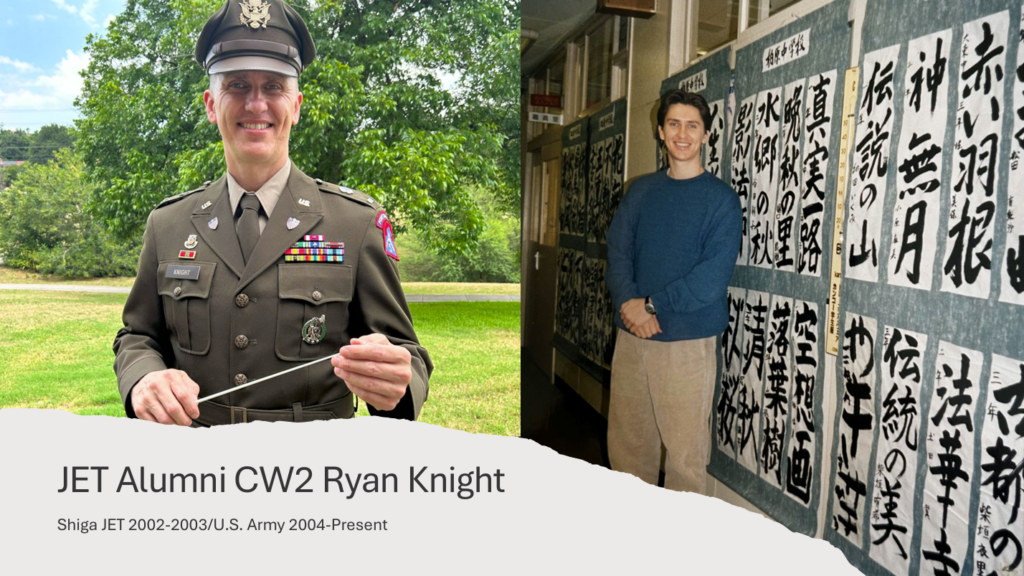
JET alum Ryan Knight (Shiga, 2002-2003) shares his JET story and how his experience living in Japan led him in an unexpected direction.
I had the time of my life as a JET teacher in Shiga Prefecture during the early 2000s. Fresh out of graduate school at Michigan State University with a major in Music Performance, I was ready for a break before pursuing a Doctor of Musical Arts (DMA) degree. At the time, a DMA was essential for securing a teaching position at the university level. The previous summer, I had studied in Shiga Prefecture as an international student—a transformative experience that solidified my desire to return to Japan and immerse myself in its culture.
The early 2000s were simpler times. Social media was non-existent, the internet was in its infancy, and innovations like YouTube, AI, and the iPhone were still years away. My only connection to the world beyond Japan was a small flip phone that could send text messages of about 20 characters. Communicating with family back in the United States required a prepaid phone card costing $30–$40 and a trip to the nearest payphone—quaint by today’s standards.
Even after 23 years, I vividly remember the send-off party organized by the consulate, arriving in Tokyo, staying at the hotel, meeting other JET teachers, and riding the shinkansen for the first time. It was an unforgettable adventure for a young twenty-something fresh out of college. The JET Program is often described as offering vastly different experiences to its participants, but for me, it was nothing short of wonderful. My caring supervisors made the job immensely enjoyable, and the cultural exchange with students and teachers created lifelong memories.
Though I only participated in the JET Program for a year, I stayed in Japan, working at a cram school/private English school. Teaching both children and adults was equally rewarding. However, all good things must come to an end. The need for financial stability loomed, and my out-of-state college loan payments—totaling around $43,000—had become a burden. A musician friend mentioned that the military offered loan repayment programs, with the Navy promising $10,000 and the U.S. Army offering $65,000 for a single tour of 3–4 years. The opportunity to serve as a musician seemed too good to pass up, though my lack of military experience made me hesitant. At the time, there was no YouTube to watch testimonials and the internet provided little guidance.
In 2004, I joined the Army—from Japan, no less. The rest is history. I am set to retire this year after 21 years of active-duty service, during which I proudly served my country across Japan and various stateside locations. Beginning as a saxophonist, I rose through the enlisted ranks to E8/First Sergeant before being selected as a Warrant Officer Bandmaster/Conductor. For the past seven years, I’ve had the privilege of commanding Army Bands in Japan, New York, and now Texas.
As I transition out of military service, I look forward to leveraging my skills, experience, and passion for Japan–U.S. relations in the next chapter of my professional life.
If anyone in the JET community past or present needs anything, please don’t hesitate to reach out!
Life After JET: Of Legal Discourse and Family Ties
Re-published after its first appearance from the JETAA NSW site: Our next Life After JET alumni is Shino Hamada (CIR Fukuoka-shi 2006-2011), a legal practitioner for a Sydney-based subsidiary for a major Japanese trading firm, whose life experiences show that you should always grab opportunities as they come by.
There is a tiny coastal town in the Southern part of Nagasaki Prefecture called Kazusa-machi. Besides a few holiday makers who visit its somewhat white sandy beaches in the summer, Kazusa-machi is usually a town which people merely drive through on their way from Nagasaki City to Shimabara City or vice versa. I was born there and spent the first eight years of my life running around on the beach behind our house with my three older siblings and speaking in the thickest Nagasaki dialect, until my hippie parents decided to uproot the whole family to live in New Zealand.
We continued to speak Japanese at home in West Auckland for four years, until my parents divorced and mum left us and returned to Japan. In order for us to overcome this incident, my dad forbade us to speak Japanese to each other and ordered us to discard everything that was Japanese, including our beloved Doraemon comic books and anything that reminded us of mum. My dad often spoke of his negative feelings towards Japan which rubbed off on me to the extent that I refused to speak Japanese at all for the next six years.
Still, Japan was always in the back of my mind and I was always a tiny bit curious about it. I also had not seen mum since she left us, so when I finished high school, I decided that I might as well go live with her in Nagasaki for a year. I arrived in Japan with a very low expectation and an extremely rusty tongue for the language, but what I found there was something beautiful, what I can only describe as ‘comfortable’ and I quickly fell in love with the culture and the people. I worked at a local supermarket fulltime and also taught English to primary school children in the evenings and weekends and loved every minute of it. At the supermarket, there would be regular customers who would always come and happily chat with me about their grandchildren or their pet dog and give me pumpkins from their garden. At the English school, the kids were always happy to see me and eager to learn.
Once the year was over, I returned to New Zealand to start university and decided to study Linguistics and Language Teaching. In my second year, a friend suggested that a Bachelor Arts would merely make me employable at McDonalds, which I gullibly believed and decided that I would study law to complement my Bachelor of Arts. In my last year, I decided to apply for the JET Programme as a CIR so that I could spend a couple of years living near mum and gain some experience working in a Japanese office. I did not really intend on becoming a lawyer after I graduated, but since I had eight months between the end of university and my departure for Japan on the JET Programme, I thought I might as well complete my professional legal studies course and I became admitted as a lawyer in New Zealand a couple of month before I left for Fukuoka.
In Fukuoka, I worked for the International Affairs Department in the city hall along with two CIR’s from non-English speaking countries. At first, people were curious about my background but they soon accepted that I was just a New Zealander who happens to look Japanese and speaks Japanese with an odd mix of a Nagasaki – New Zealand accent. My duties included translating and proofreading documents, interpreting for visitors from abroad, acting as a liaison between Fukuoka and a few of our sister cities, conducting monthly lectures for volunteer interpreters, judging speech contests, and conducting job interviews in English. I loved my job and I loved Fukuoka even more, to the extent that my initial intention to stay a maximum of two years was quickly disregarded and I ended up staying the JET maximum of five years.
At the returners’ conference in Tokyo in my fifth year, I still had not yet decided what I wanted to do or where I wanted to be after Fukuoka. I had vaguely toyed with the idea of combining my Japanese language skills with law in Japan previously, but when I spoke with a recruiter in my fourth year on JET, he advised that there are no opportunities for an inexperienced lawyer in Tokyo and that I should return to New Zealand and practice law for at least a couple of years before exploring the legal market in Tokyo. Nevertheless, by chance, I met a legal recruiter at the returners’ conference career fair, who heard of my law qualifications and my experience in a Japanese office and arranged an interview for the next day with the Tokyo office of a British law firm who was looking for a bilingual paralegal. I thought it would be a good practice job interview and thought I might as well try it. I went to an internet café that night and abruptly typed up my CV both in English and Japanese and I was lucky enough to be hired as a paralegal with a possibility of being promoted to a lawyer down the line.
I moved to Tokyo a couple of weeks after I bid farewell to my sweet home for five years and to my coworkers at the city hall who had become my beloved extended family. Once in Tokyo, I worked the hardest I had ever worked in my life, logged in long hours and hardly refused any work that came my way. The five year gap between my law degree and this job was somewhat filled by my experience working in a Japanese office and my understanding of the Japanese business culture which I shared with the foreign lawyers in the office. An Australian partner at my firm liked my work, took me under his wing and I had the privilege to be one of the core team members for a major acquisition of a multinational coal joint venture. It was a laborious few months and at times it felt as though I hardly slept, but the sense of satisfaction I felt once it was over was well worth it. I decided then that I quite liked law, continued to work hard and I was made an associate lawyer a year after I joined the firm.
However, after a year as an associate lawyer, I started to become restless in Tokyo. I had been in Japan for seven years at that point and was ready for something new. I also felt that I had been immersed in the Japanese culture for a bit too long and even starting to forget some English words. Luckily, the Australian partner who pushed me to become a lawyer had returned to Sydney and was keen for me to join him in Sydney and had an interesting secondment opportunity at the Australian subsidiary of a major Japanese trading house.
I joined the Sydney office a year ago, and have ever since been seconded to the infrastructure team of the Japanese trading house where I like to think I am maximising my Japanese language skills, understanding of Japanese business culture and my legal knowledge. I assist the company on its investments in infrastructure public-private partnerships in Australia from the pre-bid consortium discussion stage through to the actual bid or financial close, as well as identifying and analysing new opportunities for our counterparts in the Tokyo head office.
I do not think anyone is ever sure if the path they have taken is the right one, but if I had not had an open, ‘might as well’ attitude towards learning more about Japan after high school, studying law, obtaining my legal qualifications, staying five years in Fukuoka immersing myself in the Japanese office culture, taking the opportunity to interview at the Tokyo office of my law firm and taking the secondment opportunity in Sydney, I would never have experienced all the things I was able to experience, been able to come to terms with my bicultural upbringing or found a way to combine all my skills.
If you are a returning JET and you do not yet know what you want to do or where you want to be and an opportunity which slightly piques your interest pops up your way, why not shrug your shoulders and think ‘might as well’? It might take you down a route you had never dreamt of, but which may end up being one of the right paths for you.
Kitcher’s Café #003: Making the Most of Your Network
Kitcher’s Café, a new series by Lana Kitcher (Yamanashi-ken, 2010-12) is an assortment of articles, topics and commentary written for the JET Alumni community. Lana currently serves as the Business Development Associate at Bridges to Japan, a New York-based cross-cultural consulting firm founded by JET alum Jennifer Jakubowski (Hokkaido, 1995-97).
Dear recent JET returnees and current “job hunters,”
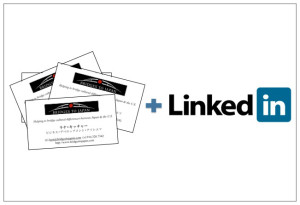 I was given the opportunity to speak at the JETAANY Career Forum in New York City a few weeks ago. Approximately 25 recent returnees (plus JET alumni going through a career transition) attended the event and were able to learn from the presenters, and also from one another, about how to successfully land a job in today’s economy. We learned that it is important to keep strategies current as technology continues to change and as the methods of yesterday are not necessarily effective for our search today.
I was given the opportunity to speak at the JETAANY Career Forum in New York City a few weeks ago. Approximately 25 recent returnees (plus JET alumni going through a career transition) attended the event and were able to learn from the presenters, and also from one another, about how to successfully land a job in today’s economy. We learned that it is important to keep strategies current as technology continues to change and as the methods of yesterday are not necessarily effective for our search today.
I would like to share with you some of the points from my presentation called “Making the Most of Your Network,” in case some of you are also going through this transition now. When I first returned home from the JET Program I had a really difficult time figuring out how to start the job search. At that point my only full-time job had been teaching English in Japan, and I didn’t know how to start looking for a new job from scratch. It took me until mid February to get a job, and I really wish someone had told me what I needed to hear earlier.
Kitcher’s Café #002: Staying Connected
Kitcher’s Café, a new series by Lana Kitcher (Yamanashi-ken, 2010-12) is an assortment of articles, topics and commentary written for the JET Alumni community. Lana currently serves as the Business Development Associate at Bridges to Japan, a New York-based cross-cultural consulting firm founded by JET alum Jennifer Jakubowski (Hokkaido, 1995-97).
Although it has been a full year since my return, I continue to enjoy sharing stories and experiences with my friends from and in Japan. Recently, one of my old colleagues from Yamanashi visited New York for the first time and contacted me through facebook to meet up. I took her and her travel partner to “Penelope,” a small restaurant on E 30th and Lexington Ave in New York. I was pleasantly surprised to see facebook photos of them going there for breakfast every day thereafter for the duration of their trip. It was a great and satisfying feeling to make these arrangements with her and be able to see the results.
As you are settling into a familiar state, maybe even feeling like your time in Japan was actually all a dream – you may wonder how it might be possible to keep up with your friends and colleagues that you met while in Japan. Thanks to social media, staying in touch has never been easier.
Kitcher’s Café, a new series by Lana Kitcher (Yamanashi-ken, 2010-12) is an assortment of articles, topics and commentary written for the JET Alumni community. Lana currently serves as the Business Development Associate at Bridges to Japan, a New York-based cross-cultural consulting firm founded by JET alum Jennifer Jakubowski (Hokkaido, 1995-97).
As I sat in my empty Yamanashi apartment, one year ago this month, a flood of feelings rushed over me. I had come full-circle, able to cram everything into two suitcases again with anxious yet excited feelings of leaving home for something unfamiliar. I had a bundle of memorabilia set aside to take with me, and pictures of the last days that I had with my students, coworkers and friends. I knew it was going to be hard to say goodbye and turn the page to the next exciting chapter of my life, but I didn’t think that it was going to feel so daunting. This was the first time in my life that the next steps were utterly unplanned and unpredictable. After high school I knew I was going to college, during college I knew I wanted to work for the JET Program… but now that the JET Program was over, the next year was a completely blank slate. I was going to have to return to my hometown temporarily to figure it out, and that idea to me was terrifying.
Many of the JETs that are in Japan right now are clearing out their desks, packing up their apartments, attending farewell parties, and being brought to tears by the students and coworkers that shared many moments with them this past year (or five). Where once was an unfamiliar, foreign and strange place, has become normal life. Do they realize that many of them are about to leave Japan, bound for an even stranger land – the one that they once called home?
As many of us have experienced, returning to your home country after any amount of time living abroad is more challenging than it may seem at first. They try to warn us about reverse culture shock, but we convince ourselves that “I will be different,” and “It won’t happen to me, I already know what to expect.” Some people really don’t experience any strange or frustrating feelings when returning home, but for individuals like myself, the first year back may be a challenging and rocky road.
As JET alumni, what do you wish someone had told you during your final days in Japan? What are some of the words of wisdom that you wish you had known before coming back? How can we help these transitioning JET participants, soon to join the alumni community? My advice to them would be this: Read More
Life After JET: Return to Japan? You can, and I did, as a Rotary International Peace Fellow
As a JET alum, have you ever thought about returning to Japan in a different capacity? Are you interested in earning a fully-funded MA in Peace Studies in Tokyo? You can, and I did, as a Rotary International Peace Fellow. (In fact, there have been at least five JET alums who have gone on to be Rotary Peace Fellows) For me, it was a perfect chance to return to Japan and advance my career at the same time.
Like many JET alums, I’d always thought it would be nice to live in Japan once again, but was not as interested in taking the Eikaiwa route. I had a wonderful experience as an ALT in Nagasaki (2000-04) and truly treasured my time there. After my time on JET, I had returned to the States and was living and working for the US Govt in Washington, DC through the Presidential Management Fellows (PMF) Program. Still, I missed the experience of daily life in another culture and was looking for a way to make it happen. Through a friend of mine named William Daniel Sturgeon, who is also a JET alum and a former Peace Fellow, I learned about this great opportunity. Thanks to his great advice and mentoring, I was able to complete the application and selection process successfully and become a Rotary International Peace Fellow in Japan in 2010.
Through the Rotary Fellowship, Read More

